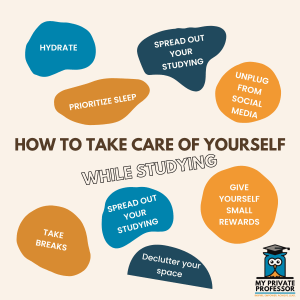For a number of reasons, getting into a solid study flow can be a challenge. Maybe your mind’s elsewhere. Perhaps you’re just really excited about the upcoming Love Island season, or maybe you’re distracted by the prospect of getting a chocolate lab puppy.
And really, there’s just countless possibilities for distractions—especially if you’re studying on the computer…it’s just too easy to open up a tab and then 20 minutes later, find yourself going down a deep Reddit rabbit hole.
That’s why we’ve compiled a list of study tips that hopefully, can help you get into your study groove.
- Circle/highlight all exam dates on your syllabi.
- Start with the most difficult material.
- Create a study checklist for each subject.
- Attend at least one of the offered review sessions.
- Jot down questions you have while reviewing.
- Create collaborative Quizlets with your classmates.
- Keep a running list of topics that will be covered on each exam.
- Highlight main ideas in your textbooks.
- Come up with questions to ask yourself based on readings.
- Then try answering them without looking at your notes.
- When dealing with complex info, read your textbook aloud.
- And then try explaining the information to someone else.
- Take regular study breaks to improve your focus.
- Break down overwhelming material into smaller chunks.
- Try to understand concepts before memorizing them.
- Ask your teachers about the structure of their exams.
- Ask your teachers for any recommended extra resources.
- Avoid studying in your bed.
- Remove distractions before starting a study session.
- Avoid studying while watching TV.
- Practice deep breathing exercises to reduce stress.
- Exercise regularly—which improves your ability to retain information.
- Even better, exercise right before studying.
- Use mnemonic devices to help you memorize concepts.
- Take advantage of helpful study apps.
- Create a study schedule.
- Silence your cell phone.
- If you still find yourself tempted, put your phone out of sight.
- Utilize site-blocking programs to avoid online distractions.
- Use noise-canceling headphones if there’s distracting noise around you.
- Snack on brain food.
- Nuts, dark chocolate, berries, eggs.
- Jot down key vocabulary words.
- Utilize the sample problems in your textbook.
- Provide yourself small rewards for achieving your goals.
- Study to music—research shows that this may help with retention.
- Declutter your study space.
- Don’t forget to review “the easy stuff”.
- Figure out what time of the day yields your best concentration—and study then.
- If you have a lot of questions, try joining a study group.
- Make a running list of mistakes you frequently make.
- Then prioritize those areas next time you review.
- If the test is on physical paper, prepare by rewriting your notes by hand.
- Try The Pomodoro Technique.
- If you’re studying at home, tell your family to avoid distractions.
- Utilize diagrams when studying complex processes & systems.
- I.e. the human brain
- As you review your reading, make active notes in the margins.
- If the exam is cumulative, review all old exams.
- Utilize study techniques that cater to your unique learning style.
- After reading a section in your textbook, try to summarize in your own words.
- Hydrate while studying.
- Switch between topics every half hour or so.
- If you missed any required reading, do it before your exam.
- Use mind-mapping to organize your thoughts.
- Turn memorization-based learning into songs.
- Try meditating before a long study session.








